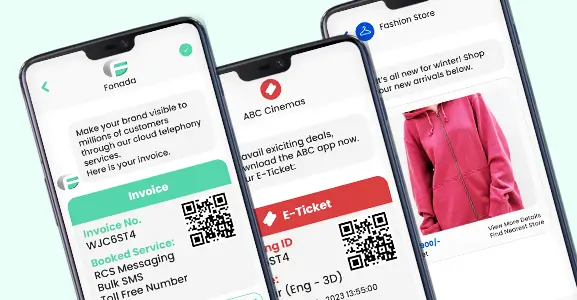With the rise of digital transformation, cloud-based technologies are taking over traditional business operations. As businesses continue to progress and grow, they need to ensure that their communication channels are efficient and effective, and this is where cloud contact center’s come in. A cloud-oriented contact center is a collection of cloud-based tools, applications, and services designed for contact centers in large organizations.
Cloud-based contact center are vital for businesses that depends on a modern, hassle-free customer support platform. Cloud center support multiple communication channels, such as inbound and outbound phone calls and messaging, and offer advanced call routing. Unlike a call center that only manages phone calls, a contact center handles customer interactions across various channels.
Unlocking The Power Of Cloud Contact Center
An efficient contact center is crucial for businesses that interact directly with clients. Poorly handled sales or support calls can lead to lost revenue and a negative impact on the company’s reputation.
This comprehensive guide will provide information on how cloud contact center are revolutionizing the customer service industry along with their functionality, implementation, benefits, features, future, and more.
What Is A Cloud Contact Center?
A cloud-based contact center is a communication hub on the internet that manages customer interactions through multiple channels. It is a virtual communication hub hosted on a cloud platform (Internet server) that provides centralized communication channels for inbound and outbound phone calls, customer inquiries and interactions through various channels, including voice, web, email, chat, and social media.
It offers various features to organizations, addressing communication challenges with their clients across multiple channels. And provides advanced call routing, agent management, and analytics capabilities.
Unlike traditional on-premise contact centers, a cloud-based contact center is not restricted to a specific physical location. With a cloud contact center, any team member can access it from anywhere in the world.
Cloud call center utilize two primary technologies: ACD and IVR systems. Interactive voice response system greets callers with an audible menu and allow them to choose menu options by pressing a number or speaking a request interpreted by natural language processing.
On the other hand, ACD provides automated call routing in the background to ensure that each incoming call is connected to contact center agent. It directs callers to the most appropriate agent to assist them.
Statistics On Cloud Contact Center
In 2022, the contact center industry saw a surge in cloud-based tools adoption, and the CCaaS market is projected to reach a $19.8BN valuation by 2031. The statistics below highlight the trends driving this growth and influencing contact center decision-making:
57% of customers prefer to engage companies through digital channels.
75% of contact centers are already in the cloud, but half of the respondents want to move to a more advanced service.
The cloud increases employee engagement and satisfaction and enables innovation tools like AI.
Replacing people with AI chatbots could save up to $80 billion in staffing costs per year by 2026.
Interaction analytics, predictive routing, customer prediction models, and insight generation are some of the exciting tools in the contact center industry.
These statistics prove that companies must adopt new and innovative technologies to enhance customer experiences while being efficient and scalable.
How Does A Cloud Contact Center Work?
A cloud-based contact center handles all customer communication over an internet connection. Contact center providers handle all technical setup, equipment, and maintenance aspects. Interestingly, cloud centers don’t require telecom hardware.
Moreover, messages and phone calls use Voice over Internet Protocol (VoIP) technology. Contact center software connects to other platforms with a customer or prospect account. It assigns incoming communications to the right agent to avoid conflicts.
A cloud contact center is a robust set of tools and applications that serves as a centralized hub and enables remote contact center agents to handle all inbound and outbound customer interactions.
This solution offers organizations multiple capabilities to address communication challenges with their clients, such as facilitating communication through various channels, sophisticated call routing, agent management, and analytics. A cloud contact center solution typically operates in various ways to achieve these goals.
Top 5 Cloud Contact Center Solutions
Step 1: Communication Channel Integration
It integrates different communication channels into a single system, ensuring agents can communicate with clients through multiple modes.
Step 2: Advanced And Sophisticated Call-Routing
It provides advanced and sophisticated call routing, enabling customers and clients to speak to a qualified agent quickly.
Step 3: Agent Management
The solution expertly manages agents with digital interaction recording and analytics, quality management, performance management, gamification, and more.
Step 4: Streamline With Automation & Analytics
A cloud contact center streamlines with automation and analytics, making data-driven decisions to accelerate businesses by leveraging AI, business intelligence, analytics, and real-time reporting capabilities.
It also seamlessly connects other business systems, aggregates data, provides comprehensive performance views, and automates workflows.
Step 5: Access To Intuitive Dashboards & Detailed Analytics
Finally, the solution provides access to intuitive dashboards and detailed analytics, allowing supervisors to view and analyze data such as call waiting time, average call duration, and agent idle time to ensure the optimization of contact centers.
Why Cloud Contact Center For Customer Service Industry?
Cloud contact center offer a cost-effective and flexible solution for the customer service industry, allowing businesses to provide efficient and personalized customer support across multiple channels.
Real-Time Support Warranty
The Service Quality Measurement (SQM) Group, a leading customer contact research and consulting firm, discovered that 38% of customers are at risk of switching to competitors if their concerns are not addressed during their first call.
However, resolving issues satisfactorily on the first call reduces this number to just 3%.
Cloud contact center solutions use a hub-and-spoke approach that enables agents to follow a customer’s journey across multiple channels. This enhances agents’ ability to provide efficient customer service, solve issues in real-time, and even anticipate their customers’ needs.
Faster Deployment Of New Capabilities
If your company is using premises-based contact center systems, deploying new technologies like messaging, social, chat, and email capabilities can take weeks or even months.
But with a cloud contact center, you can quickly add capabilities as needed, allowing agents to act on new opportunities without delay. Additionally, you can easily pilot new sales tools and systems before making a long-term commitment.
Superior Disaster Recovery And Business Continuity
A traditional call center system that is based on premises does not offer the necessary scalability and flexibility for effective disaster recovery without investing in expensive redundant hardware and software licenses.
This could potentially result in lengthy downtimes, where your company may be offline for days, weeks, or even longer while sourcing new vendors or installing new hardware and software.
Your business can benefit from superior business continuity by utilizing a cloud-based contact center, with infrastructure and data hosted in a remote data center away from potential disruptions.
The cloud can be accessed from anywhere with an internet connection, meaning agents can easily access the contact center from their smartphones, laptops, tablets, or desktop computers. In the event of a disaster, agents can instantly switch to mobile devices or softphones on their home computers or temporary workspaces.
Strong Security And Compliance
A contact center in the cloud offers robust security and compliance solutions that protect customer information and data. The installation of the latest security measures that meet privacy regulations can be expensive and time-consuming for IT organizations.
Maintaining strong physical security across various on-premises systems is not practical or cost-effective. Hosting all customer data in secure Tier 1 data centers, managed by highly trained on-site engineering specialists, provides companies with greater security measures to safeguard their virtual calls.
Benefits Of A Cloud Contact Center
A fully-fledged cloud contact center offers many benefits, including cost savings, scalability, flexibility, and enhanced customer experience.
1) Cost Savings With Cloud Contact Center
Cost saving is a major advantage of using a cloud contact center over a traditional on-premise one. The latter involves significant hardware, software, and upkeep expenses, while cloud contact center operate on a cloud-based platform, eliminating these investments.
Furthermore, cloud contact center provides flexible pay-as-you-go pricing options that enable businesses to pay only for the services they utilize.
2) Enhanced Customer Experience With Cloud Contact Center
Cloud contact center enhance customer experience by enabling businesses to interact with their customers seamlessly across multiple channels. By providing omnichannel communication options, customers can choose their preferred mode of interaction, leading to higher satisfaction levels.
Additionally, cloud contact center offer advanced functionalities like automatic call distribution, call queuing, and call routing to ensure that customers are efficiently routed to the right agent.
3) Scalability And Flexibility Of Cloud Contact Center
Cloud-based contact centers allow businesses to adjust their capacity according to their requirements. On-premise contact centers require more hardware and software to accommodate growth, whereas cloud contact centers can easily scale up or down as needed.
Furthermore, cloud contact center offer the advantage of operating from any location with internet access, providing businesses with the flexibility to enable remote working capabilities.
Cloud Contact Center Integrations With Other Business Applications
Cloud contact center can integrate with other business applications, including customer relationship management (CRM) systems and marketing automation software, to improve efficiency and streamline operations.
Integration with these applications provides businesses with a complete view of customer interactions, enabling them to offer personalized and tailored customer experiences. Cloud contact center can incorporate various business applications to improve their efficiency and streamline operations.
- Business Intelligence Integration: Integrating with business intelligence tools provides contact centers with valuable insights into customer behavior, allowing them to optimize their service and support strategies.
- Collaboration and Productivity Tool Integration: Integrating with collaboration and productivity software like project management tools or team messaging apps improves communication and coordination between agents and supervisors.
- Customer Relationship Management (CRM) Integration: Integration with CRM software provides agents with access to customer data and interaction history, enabling them to offer personalized service and resolve issues more efficiently.
- Helpdesk Integration: Integration with helpdesk tools enhances ticket management and enables agents to provide prompt customer support.
- Marketing Automation Integration: Integrating with marketing automation software helps contact centers identify potential sales opportunities and route them to the appropriate sales team.
- Social Media Integration: Integrating with social media platforms allows contact centers to monitor and respond to customer inquiries, queries, and complaints on social media channels.
Features Of A Cloud Contact Center
Cloud contact center are altering the way businesses handle customer service. They offer a wide range of features that help organizations provide exceptional customer experiences while improving operational efficiency. Here are some key features of cloud-based contact center that are revolutionizing the customer service industry:
1) Advanced Analytics:
Cloud contact center’s offer advanced analytics that provides real-time insights into customer behavior, allowing businesses to optimize their customer service strategies. This includes data on call volumes, customer satisfaction, and agent performance, among other metrics.
2) AI And Automation:
Cloud contact center’s use AI and automation to enhance customer experiences and streamline operations. This includes features such as chatbots, voice recognition, and automated workflows that help businesses provide faster, more personalized service.
3) Omnichannel Support:
Cloud contact center offer omnichannel support, allowing customers to communicate with businesses via multiple channels such as phone, email, chat, social media, and SMS. This provides customers with a seamless experience, as they can choose the channel that best suits their needs.
4) Remote Access:
Cloud-based contact centers provide agents with remote access, enabling them to work from anywhere with an internet connection. This feature allows businesses to hire talent from anywhere in the world, expanding their talent pool and reducing overhead costs.
5) Scalability:
Cloud contact center can easily scale up or down based on business needs. They offer the flexibility to add or remove agents, adjust resources, and handle higher call volumes during peak periods.
Overall, cloud contact centers are transforming the customer service industry by providing businesses with the tools and features needed to deliver exceptional customer experiences while improving operational efficiency.
Comparison : Cloud Contact Center Vs. Cloud Call Center
When comparing cloud contact centers to cloud call centers, the primary distinction lies in agents’ customer interaction methods.
Cloud-based call center software is specifically designed to handle a high volume of both inbound and outbound phone calls where agents communicate with customers in real-time.
As a cloud-based solution, it can easily scale to meet the demands of a growing organization, and agents can work from the office, remotely, or a hybrid of both.
In contrast, cloud-based contact centers handle phone calls while also integrating other communication channels such as email, social media, text messages, chatbots, and video.
This creates a seamless system where customers can receive assistance through their preferred channel while ensuring consistent improvements and quality management.
| Benefits Of Contact Center | Benefits Of Call Center |
|---|---|
| Advanced ticket routing | Advanced call distribution |
| Task automation | Handling a high volume of calls |
| Unified customer data & consistent experience | More in-depth call analytics |
| Shorter wait times and more flexibility for customers. | Maintaining a call center is less expensive |
| Proactive support before the problem escalates | Less risk & easier to manage agents and their tasks efficiently |
Primarily, contact centers provide the means for omnichannel support and personalized self-service. Call center solve the purpose of phone-based customer service, fraud prevention, market research, cold calling, outbound sales, and lead nurturing.
Comparison : Cloud Call Center Vs. PBX
Private Branch Exchange (PBX) is a communication solution that is hosted on-site and offers services similar to those of a hosted solution but without the additional infrastructure expenses.
A cloud contact center is a collection of comprehensive tools, cloud-hosted services, and apps designed to manage customer service. Let’s compare cloud call centers with PBX.
Functionality (Cloud Call Center Vs. PBX)
Cloud PBX Solution Functionality
It enables businesses to route calls efficiently, improve customer service delivery, and enhance overall customer experience by mapping multiple phone numbers to a single trunk line. With the cloud PBX feature, agents can see caller information when a call connects, enabling them to resolve issues on the first call.
Cloud Contact Center Functionality
It provides access to various tools to handle customer interactions, whether via phone call, email, web chat, or social media. With a Cloud CC, agents can operate on a single screen with all the relevant information displayed in one place.
Features (Cloud Contact Call Center Vs. PBX)
- The click-to-call feature enables visitors to call a company directly from their website.
- Collaboration features like screen sharing, call transfer, and call conferences enhance customer service.
- API interface allows integration with other cloud services for centralized reporting and management.
Features Of Cloud Contact Center
- Cloud telephony applications improve call management and offer productivity and monitoring features.
- Multi-channel integration allows agents to use both desk and mobile phones, increasing productivity.
- Skill-based routing and Automatic Call Distribution (ACD) match callers with the most suitable agent.
- Omnichannel support across various communication channels provides superior customer service and boosts productivity.
- Comprehensive integration of multiple customer outreach channels offers a 360-degree understanding of customers’ needs.
Advantages (Cloud Contact Call Center Vs. PBX)
Cloud PBX
A hosted telephone system replaces traditional business telephone equipment such as Telkom PABX or IP PBX and TMS (telephone management system) with a hosted service. It is used for internet infrastructure and is less expensive than traditional analog calls.
Cloud Contact Center:
According to a recent Gartner case study, moving a contact center to the cloud can increase customer satisfaction. A cloud contact center is a cutting-edge solution that offers deeper customizations such as advanced routing, whisper coaching, knowledge base integration, advanced auto attendants, and interactive voice response.
Cloud contact center can integrate artificial intelligence and natural language processing into their stable platform. Detailed analytics and logging tools such as call and screen loggers inform supervisors about the call center operation.
Additionally, reporting and analytics can provide real-time metrics and insights to help management and staff adjust. They can provide advanced dialers that perform predictive dialing, saving time for agents who would otherwise dial out manually and wait for the call to be connected.
Traditional On-Premise Contact Center Vs Modern Cloud Contact Center
The fact is undeniable: traditional on-premise contact centers are becoming outdated. It’s no wonder that IDC has forecasted that cloud-based business solutions will continue to surpass investments in on-site technology in the next few years, with a projected growth rate of 54%.
Industry experts predict that cloud-based infrastructure will continue to displace on-premises solutions.
Traditional on-site contact centers are burdened with the need for physical employee presence, constant upkeep, and costly and quickly outdated hardware.
These call centers focus mainly on phone conversations, which do not align with the demands of modern customers. Consequently, cloud-based contact center solutions are the optimal choice for fast-growing companies.
Cloud contact center, in contrast, offer rapid deployment, increased flexibility, and real-time analytics, resulting in reduced operational expenses, an enhanced customer experience, and quicker market entry. Look at the comparison between the two based on the following functions.
| Function | Traditional On-Premise Contact Centers | Modern Cloud Contact Centers |
|---|---|---|
| Time to market | Longer time | Shorter time |
| Pricing | High up-front costs | Low up-front costs |
| Risk | Higher security risk | No data breach |
| Security Fee | Expensive | Affordable |
| Data | Data leakage fears | Secure at a remote location |
| Hardware Installation Time | timeline of several months | set up via an app |
| Set up and Ongoing Costs | hefty front-end price tag | Simple monthly subscription |
| Agent Productivity | Higher lag time | Minimal steps |
| Reliability | Big challenge; susceptible to anything | Reliable architecture |
| Collaboration | Higher manual practices for managing calls | Automatic call functionality |
| Privacy | Compromised | Higher and guaranteed |
| Integration | Hectic and time-consuming | Faster and reliable |
Cloud Contact Center For Improving Customer Experience
Cloud based contact centers are becoming increasingly popular due to their ability to provide a seamless customer experience. With all customer communications integrated in a single platform, agents can access customer data quickly and efficiently, leading to faster resolution times.
Customers can communicate through their preferred channels, such as calls, emails, text messaging, and chatbots.
Deep analytics across all calls are readily available, allowing for better insights into customer needs and agent performance. Modern features like automatic callback and smart routing reduce hold times, while real-time monitoring and feedback help agents improve their skills.
These factors combine to provide a more satisfying and personalized customer experience.
Before Migrating To The Cloud:
- Customer communications are isolated among various departments and teams.
- Customers have limited options to communicate through fragmented channels.
- Call analytics data is reduced to incomplete data points.
- Callers spend significant time on hold waiting for the next available agent.
- Measuring, analyzing, and improving agent performance is challenging.
After Transitioning To The Cloud:
- Agents can access all customer communications on a single, integrated platform.
- Agents receive better feedback and training based on real-time analytics and monitoring.
- Calls are routed smartly with less hold time and modern alternatives such as automatic callback.
- Customers can reach out using their preferred communication channels: calls, emails, text messaging, chatbots, and more.
- Deep analytics across all calls are readily available and easy to access.
Choosing The Right Cloud Contact Center Provider
In the past, contact centers required on-premise setups to function efficiently, but now businesses are adopting cloud-based solutions to achieve their goals, provide personalized customer service, and operate efficiently.
Cloud contact center provides a comprehensive suite of communication tools that can be accessed from anywhere with an internet connection.
Traditional contact centers focus only on voice calls, but a contact center in the cloud offers both inbound and outbound call management, secure access, and faster deployment of omnichannel customer engagement.
Excellent customer service is essential for business growth and provides a competitive edge. However, selecting a customer service provider requires thorough upfront research to make the best decision.
As organizations add more support channels, a cloud contact center solution helps them stay on top of customer requests and optimize agent productivity. Choosing the right contact center software is critical for driving efficient and effective business performance.
Cloud-based contact center’s are proactive, intelligent, and scalable, but selecting the right one based on specific business needs can be challenging. To select the best cloud contact center service, consider the following tips.
Tips To Choose The Right Cloud Contact Center Vendor
Here are some tips for selecting the right cloud contact center for your business:
Check the Provider’s Customer Service Policies: Before investing in a cloud-based contact center solution, research the provider’s experience and background. Ask for testimonials and reviews, and check online forums and social media groups. Ensure that the provider has a helpful and responsive customer care policy.
Determine Your Business Goals: Before outsourcing services, it’s crucial to identify your business needs, the type of support you require, and any specific metrics you expect from the contact center. Determine the business goals you want to achieve with cloud-based solutions, such as first-time resolution, cost-effectiveness, agent training, and 24/7 customer service.
Embrace Innovations: Keep track of changing customer behavior and interests and offer customer service in the best-suited language and mode of communication.
Identify Your Communication Channels: Determine the most convenient communication channels for your business and let customers choose their preferred medium to reach out. Use an omnichannel cloud-based contact center solution that combines all communication channels to provide a unique customer experience and optimize customer retention.
Prioritize Reliability: Select a dedicated contact center provider with agent training initiatives, disaster recovery, and business continuity plans. Observe the contact center environment in action to assess whether the provider can represent your organization effectively.
Implementation Of A Cloud Contact Center
Cloud-based technology has become a valuable asset for modern contact centers. It offers the latest features and functions, along with increased flexibility and decreased IT burdens.
This makes it an attractive option for decision-makers, with promising economics and speedy implementation. However, successful implementation still requires careful planning and intentional design of both the technology and associated business processes.
Many cloud communication service providers specialize in helping companies unlock the full potential of their technology investments through meticulous project planning and execution.
With extensive technology expertise, exceptional project management skills, and real-world implementation experience, they provide expert advice with no hidden agenda due to our vendor independence. Their expertise also allows them to identify potential issues and navigate the path to success.
The Challenge
The Problem
Contact centers that rely on outdated technology can benefit from switching to cloud-based technology. These centers may be struggling with limited tools, which can lead to severe issues such as poor service levels and high abandon rates. They may also lack visibility into the customer experience and staffing problems. Sometimes, they are forced to change their technology because their vendors will no longer support their current systems.
Cloud-Based Technology
Cloud-based vendors have developed an efficient approach to implementing new technology. They use “workbooks” to gather client input and configure their offerings accordingly. However, this approach can lead to delivering the same old solution on a new platform. While it solves the problem of technology obsolescence, it doesn’t bring any significant changes to the operation.
Lack Of Planning
Without proper planning, the center may not choose the best vendor solution for their needs or plans for the future. They may also underutilize the solution because they don’t understand its full potential. During implementation, testing, and cutover, staff may struggle to keep up with the numerous tasks expected of them. After the cutover, they may have difficulty adjusting to the changes that come with a new system.
The Solution
To start the planning process for implementing cloud-based contact center technology, cloud communication solution providers help call center management set operational objectives while gaining insight into what’s possible. The next step involves a detailed design session that translates high-level objectives into concrete instructions for system configuration. This process may entail a radical shift in operations or the integration of new features like callback queuing and omnichannel routing and management. The flexibility of cloud solutions makes it easy to get up and running and add capabilities over time.
A contact center in the cloud can serve as the project manager and SME throughout the implementation, providing coaching on business process design to take advantage of new capabilities and establish a more customer-responsive, efficient operation.
They handle changes that arise during the learning curve, which can have implications for process or technology design, training, test plans, and rollout. They oversee the vendor’s training program, guide the testing process, and help to resolve any issues that may arise during cutover.
Post-cutover, they ensure clients have all the tools and training they need to use their new system effectively. They help clients plan for the future and determine the timeline for taking the next steps to leverage their new solution further.
With extensive technology expertise, project management skills, and real-world implementation experience, they ensure a transformational impact on the technology and associated business processes. Their vendor independence ensures the delivery of expert advice with no hidden agenda.
Future Of Cloud Contact Centers
Contact centers have witnessed significant changes in recent years, including the rise of omnichannel, virtual assistants, and cloud platforms.
The increasing adoption of new technologies and customer experience (CX)-driven disruptors are increasing the genuine expectations of modern, digital-native customers who are eager to resolve issues quickly. Here are the top trends to watch in the development of contact center technology and the future of CX:
Self-Service By Default
Self-service will no longer be limited to simple, transactional queries. Ultimately, it will become the default method for query resolution by replacing a large volume of inbound calls.
Conversational AI And Conversational Intelligence
Conversational AI and intelligence technologies automate a large portion of the query resolution process, especially for common issues and FAQs. They will gain from advancements in data processing.
The Adoption Of Contact Center As A Service (CCaaS)
CCaaS will be the mainstream solution for any company looking to adopt contact center systems in the future. It supports flexible, pay-as-you-go implementations with a near-zero hardware footprint, ideal for small companies and remote work environments.
The Birth Of XCaaS
XCaaS bundles CCaaS and UCaaS into a single solution to manage internal and external communication with one license.
IVR Turns Into Intelligent Bots
IVR solutions are evolving into smart ‘voicebots’ capable of handling complex customer queries. Which will not only route customers, but also support self-service through smart speakers and displays.
New RPA Use Cases
RPA bots are used for small but iterative and mundane tasks that occupy much of an agent’s time. They can copy-paste data between systems, launch applications, and auto-generate post-call summaries.
Automated Coaches For Remote Agents
Automated coaches use data generated by CCaaS tools to highlight unique opportunities for improvement and make recommendations for remote agents.
The Maturing Of Prescriptive AI
Prescriptive AI generates natural language recommendations for the agent or supervisor. That enabling the contact center to address areas of concern more quickly.
The Rise Of Hyper-Personalization
Hyper-personalization unites real-time customer data with AI to generate insights. That help companies can use for strategic individualization through a system or human intervention, making customer journeys unique and personal.
New Customer Satisfaction Scoring Models
Contact centers will connected scoring methods that use customer data, predictive analytics, and machine learning to measure CX.
Solve Communication Challenges With Fonada’s Cloud Contact Center Solutions
Large organizations encounter various obstacles while managing communication with their customers or clients. Organizations must offer various communication channels like phone calls, emails, or instant messaging chats to meet customer expectations.
Supervisors must monitor and enhance service quality, while IT departments aim to deploy contact center systems quickly with minimal overheads.
A Cloud Contact Center solution effectively allows large organizations to manage customer communication challenges. That is why Fonada provides a variety of features, such as:
Advanced Call Routing
Auto-attendant and IVR ensure customers are routed to the appropriate department and qualified agent as quickly as possible.
High-Level Dashboards And Detailed Analytics
Provide supervisors with information on metrics like average call duration, call waiting time, and agent idle time. This helps businesses to optimize their contact center..
Integration Of Various Communication Channels
Phone calls, emails, and instant messaging into a unified system let agents maintain a consistent record of all communications.
Workforce Management Tools
Help agents and supervisors use their time efficiently. Many companies rely on Fonada for timely, fast, and scalable communication solutions to grow their businesses. Excellent network reliability, exceptional services, and ease of use make us different in the business communication industry.
Conclusion
Now, it is clear that a cloud contact center is an online platform that manages both incoming and outgoing calls. It provides a wide range of tools, applications to enhance customer service levels across channels. When you look for cloud contact center solutions, a cloud contact center vendor offers business enterprises of all sizes quality communication services.

Dec 11, 2024
Top Contact Center Optimization Tools For 2024
“A thriving business knows how to fetch maximum output from limited resources by optimizing ca... Read More
Nov 13, 2024
What Is Brand Communication? CPaaS Role Explained
Did you ever wonder why some advertisements grab your attention instantly, while others do not? The... Read More
Nov 01, 2024
What Is Automated Messaging And How Does It Work?
Automated messaging or text automation empowers businesses and marketing professionals to connect wi... Read MoreLatest Updates
From Fonada
Industry Insights, Trends, Innovations, Updates, and Case Studies from Industry Experts
View
Customer
Reviews
Discover why our customers love us - read their authentic and heartfelt reviews!
View
Case
Studies
Explore real-life scenarios, offering analysis, and solutions to practical challenges
View
Convert Leads Into Sales With Fonada
Trusted CPaaS Solution Provider








